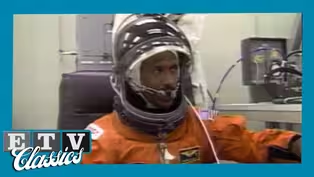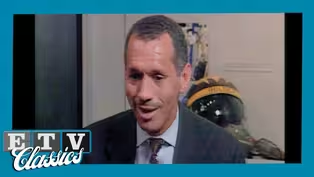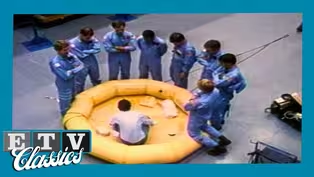ETV Classics
Colonel Charles Bolden: Aftermath of the Challenger | Carolina Journal (1986)
Season 14 Episode 10 | 27m 50sVideo has Closed Captions
Colonel Charles Bolden offers a candid reflection on the space shuttle 'Challenger' disaster.
In this interview with Tom Fowler, Space Shuttle Astronaut Charles Bolden Jr. offers a candid reflection of the aftermath of the Challenger disaster and its reverberations throughout United States space exploration. The future NASA administrator notes that the nature of his work in space is high risk, and the events of the Challenger disaster only made this clearer.
Problems playing video? | Closed Captioning Feedback
Problems playing video? | Closed Captioning Feedback
ETV Classics is a local public television program presented by SCETV
Support for this program is provided by The ETV Endowment of South Carolina.
ETV Classics
Colonel Charles Bolden: Aftermath of the Challenger | Carolina Journal (1986)
Season 14 Episode 10 | 27m 50sVideo has Closed Captions
In this interview with Tom Fowler, Space Shuttle Astronaut Charles Bolden Jr. offers a candid reflection of the aftermath of the Challenger disaster and its reverberations throughout United States space exploration. The future NASA administrator notes that the nature of his work in space is high risk, and the events of the Challenger disaster only made this clearer.
Problems playing video? | Closed Captioning Feedback
How to Watch ETV Classics
ETV Classics is available to stream on pbs.org and the free PBS App, available on iPhone, Apple TV, Android TV, Android smartphones, Amazon Fire TV, Amazon Fire Tablet, Roku, Samsung Smart TV, and Vizio.
Providing Support for PBS.org
Learn Moreabout PBS online sponsorshipMore from This Collection
South Carolina is home to astronauts Charles Duke, Ronald McNair, and Charles Bolden Jr.
South Carolina in the Space Age | Palmetto Specials (1991)
Video has Closed Captions
A look back at the experiences of Charles F. Bolden Jr. and his rise to becoming an astronaut. (18m 50s)
Conversations with Scientists and Astronauts: Charles Bolden, Part 1 (1998)
Video has Closed Captions
Learn alongside students as they ask astronaut Charles F. Bolden Jr. questions. (19m 1s)
Space Shuttle: Delays & Possibilities for the Future with Dr. LeConte Cathey | Open Line (1981)
Video has Closed Captions
Dr. LeConte Cathey discusses satellites, the space shuttle, and maintaining technology for space. (28m 47s)
South Carolina Astronauts | Venture (1986)
Video has Closed Captions
Learn more about the firsthand experiences of astronauts Charles Duke and Charles Bolden Jr. (6m 51s)
Profile: Charles F. Bolden Jr. | Carolina Journal (1986)
Video has Closed Captions
A special look at the extraordinary legacy and life journey of astronaut Charles Bolden. (58m 59s)
Kennedy Space Center: Apollo 16 Launch | Nine30 (1972)
Video has Closed Captions
An in-depth look at the launch of Apollo 16 as well as the legacy of the Kennedy Space Center. (30m 6s)
Journalist in Space | Carolina Journal (1986)
Video has Closed Captions
Host Tom Fowler interviews Jack Bass, a member of NASA’s Journalist-In Space project. (27m 52s)
General Charles Duke | Open Line (1983)
Video has Closed Captions
Host Tom Fowler interviews Apollo 16 astronaut Charles Duke about his career with NASA. (28m 50s)
Brigadier General Charles Bolden Jr. | Xpress (2003)
Video has Closed Captions
An interview with former NASA administrator and astronaut Charles Bolden. (26m 45s)
Shuttle Challenger Accident | Carolina Journal (1986)
Video has Closed Captions
Host Tom Fowler brings the breaking news about the Space Shuttle Challenger to South Carolina. (29m 38s)
Providing Support for PBS.org
Learn Moreabout PBS online sponsorship♪ ♪ Tom Fowler> Good evening, everyone...I'm Tom Fowler.
It's been a while since January of this year, and that was the month Charles Bolden Jr.
of Columbia flew on the shuttle Columbia.
He's with us now, and we've taped this a while back during a swing through Columbia by Astronaut Colonel Charles Bolden... Welcome... to Carolina Journal.
Colonel Charles Bolden> Good to be here.
Very good to be here.
Tom> Our viewers have seen you on our one-hour documentary that we aired some time back, but glad to have you here in person on the set.
>> Nice to be here.
Tom> Let's talk a little bit about the aftermath of the accident, Challenger's accident, not in any particular detail about the commission's work or any of that, but about you, about your family, about the other astronauts in the shuttle program, what this has, how this has altered what you've been doing.
Or has it altered it?
Col.
Bolden> It hasn't altered the, the basic work that we've been doing very much.
What it has done is, it's caused the schedule to get quite complicated, because in addition to the training that everybody ordinarily underwent anyway, then there was work supporting the commission and various investigations going on.
So it kind of added lots of time to everybody's day.
Tom> Is that good, all this additional effort?
I mean, obviously, Col.
Bolden> Well it's uh... Tom> after the Apollo accident, that program was set back 18 months, and changes were made to that craft, and then basically no more accidents, although there was one on the way to the moon.
Col.
Bolden> It's kind of a two-pronged answer.
It's not good in the fact that we're having to do it.
You know, you really should have never had to do it.
We never should have had the accident.
However, since it happened, what we're doing now, I think is very good, because we're stepping back and taking a very objective look at the program, reorienting ourselves, trying to decide with you know, what were our objectives, really like in comparison to what they should have been at the time of the accident because, basically, the targets that we were working to and everything else were all envisioned numbers of years ago, back in the '70s when shuttle first came about.
The funding was different in those days.
What we thought shuttle's capability would be was probably different, so it's, I think its unfortunate that an accident has forced us to take this reassessment, but it was something that very necessary, anyway.
Tom> There's always hindsight in any type of history.
Col.
Bolden> [chuckling] Twenty-twenty!
Tom> Current or past.
But could it have been done any way differently?
There were so many decisions were made, no one trying to make a wrong decision at any point in the way.
Col.
Bolden> That's hard to say, and, I don't know what the answer to that is.
You would like to think that we did everything exactly the way it should have been done, and it was just fate... No matter what we had done, it would have turned out the same way.
I guess only history will be able to tell us whether that's really what happened or not.
Tom> With any kind of human endeavor, especially one that's, as complicated as this, isn't it-- you said fate, but isn't it almost that that some problem at some point is going to come up in a human endeavor?
Col.
Bolden> It's a very high-risk environment.
People should understand, I guess, as well as we do in the office, that the nature of our work is somewhat high risk.
I like to tell kids that it's high risk when you go out and get in a car and drive down the street.
Ours, to a great extent, is a lot safer than getting into a car and going somewhere because there are so many checks and balances, so many safety insights into what we do, so that, I think overall it's probably as safe as, if not safer than a lot of things that people take for granted.
What we have to make sure that we do, is we don't lose sight of what happened in this particular instance, that we stop and think very long and hard before we do anything else.
and you don't want to make the cure worse than the illness.
We don't want any rash actions.
It's probably going to take us a considerable amount of time to regroup and get ready to go fly again.
Tom> The public, for a long time, had been getting accustomed to the program working very smoothly, in spite of criticism from the press, perhaps, of delays here and there and frustrations, I'm sure, on crew parts, such as yours, of having delays happen.
It was at a point where a launch, only Cable News Network covered the launch live, a launch live, your launch included, and the launch is lucky to get a small picture on the front page.
It was taken for granted.
Col.
Bolden> I think that's the nature of the environment in which we live.
Our society is a media-hungry society, and they look for things that are different, and it's not going to change.
The fact that we lost a shuttle means there will be extensive interest in the program when we resume flying again.
And I would imagine, that even the major news networks will probably carry the launch live and may even carry the landing live, but that won't last forever.
Tom> ...a few more flights...?
Col.
Bolden> Oh, yeah, a few more flights, and everybody will get comfortable, and then we'll go back.
Hopefully, though, what will happen is that the American public, the international public, will have been made more conscious of what's actually involved, the level of detail that's involved in carrying on "a routine space flight" so that they at least have some appreciation of that.
When we have delays, which we will have, and when we have to cancel flights, which we will have to do, and that they will have some better appreciation of why those kinds of things happen.
Tom> What is this going to do, overall, to the American space program?
This is obviously a historic point in that.
This is one of those points where things are looked at very carefully, in perspective, and we're at a point with the space program of looking ahead, beyond the shuttle program, with the Orient Express project getting tentative funding, increasing funding, with the Russians putting up their so-called space station recently, with the Europeans and their project going full tilt, trying to get the satellite business.
What about this?
Backing up just a bit, looking at it in the big picture, what's happening at this point?
Col.
Bolden> I wish I could tell you the answer to that.
I think there are people in Washington who are going to have a large part to play in what happens from here on out.
NASA is doing its part, taking a critical reassessment of where we are and where we want to go.
After that, it will depend in a large measure on what Congress decides they want us to do.
If we get adequate funding, hopefully, we'll launch an operating space station by 1992 to 1994.
Then from there, we'll construct orbiting transfer vehicles and go back to the lunar surface, perhaps, hopefully, as early as the first decade of the 21st century, we'll actually have somebody on the way to Mars or some other planet doing manned planetary exploration.
Should Congress decide that the funding is not there, then we'll go backwards or stand still.
And, you or I can't answer that question.
You know, it's the guys on Capitol Hill, who have a tendency to be very critical of other people that are now going to have to make some crucial decisions themselves.
Tom> What about the other aspects of our space program?
For so long, all the eggs were put in the shuttle... all the hopes, and all the nuts and bolts of our getting things into space with the space transport system.
Now is that changing?
Are we looking at making it more diverse?
Col.
Bolden> I think it's quite obvious from reading the newspaper and listening to any media presentations that, that is changing.
People are a part of this reassessment is having people who weigh in two different camps before, we had a hard time coming to some common ground.
So, you had the people that were in the manned space flight camp and the people that were in the expendable launch vehicle camp, and never the twain should meet.
And now, I think, I believe we're beginning to reason and say, Hey, there is a part that each of these components plays in a viable space transportation system.
You know, STS is what we call the shuttle program, and it doesn't stand for shuttle transportation system.
It stands for Space Transportation System.
That was originally envisioned to be kind of a three-pronged program with shuttle, the space station, and then orbital-transfer vehicles.
I think now that we're finding that, it's going to be a four-pronged program with shuttle, expendable vehicles, the space station, and then some orbital- transfer type vehicle.
Tom> What about the so-called Orient Express?
You're a pilot, and that's a vehicle that-- as far as press descriptions of it-- would be one that takes off from the surface, flies into near space, then boosts its way into orbit, in a low orbit, and can re...land itself again on earth.
It sounds like a purely piloted vehicle.
What about this, the concept of it?
Col.
Bolden> The concept, I think is very good.
I think what we'll have to do-- and I'm not qualified to make a judgment-- Again, just along with the reassessment, is we'll have to see what the need is.
Although I'm an active-duty Marine, I have been...very, very limited exposure to the DOD involvement with the space program, so I'm not acquainted with the needs and everything and I think that'll be part of the reassessment.
Is it something that is crucial right now, or is it something that can be delayed until we get back on... you know, get ourselves back on our feet, get shuttle going again, get the expendable boost program going, and then come back to it?
Or we may find that's something that can't wait, that has to be done right now?
Again, I'm not qualified to make that judgment right now.
Tom> Well, aside from the details of that kind of analysis, what are your feelings about it, Col.
Bolden> I have mixed emotions!
(laughing) about the concept?
Oh, the concept, I think, is great.
That's something that, the science fiction writers have always written about, and I tend to, and I guess with age, I begin to understand that the science fiction writers are a lot smarter than most of us.
They talked about man-maneuvering units, and gas powered jet backpacks, and things like that a long time ago, and now we've done that.
They probably envisioned something like, shuttle and space station, and now we're doing that.
So, the Orient Express is something whose time will definitely come.
I guess, what I'm saying is, I just don't know if its time has come now, and we'll find out soon.
Tom> To take away from the shuttle program?
Col.
Bolden> Well, there's always competition for funds, and that is something that has to be considered in the reassessment.
We can always find ourselves boxing, we can box ourselves into a corner if we decide we're going to do all things for all people with a little amount of money.
I'm a Marine, so I'm very acquainted with that.
You know, the Marine Corps is very good at doing the best of any organization in the world with the least amount of assets.
You can do that, and you can get away with it in some respects, but there are some things that you can't do that and get away with it.
Tom> What about the program though?
Should a fourth shuttle be built, or is that something the analysis will just have to see?
Col.
Bolden> Again, that's, my opinion and my impression probably differ from what a lot of the duty experts would say, but I think we definitely need a fourth and a fifth shuttle.
Ideally, what I would like to see is the effort expended toward a second-generation orbiter.
We have the technology.
We know what we want.
I personally would much rather see us spend the time and the effort in building a 1980s/1990s technology shuttle, something that's going to carry us right on into the first half of the 21st century, as opposed to building a fourth orbiter that's just like Atlantis or just like Discovery, because, you know, believe it or not, that's that's essentially old technology.
That's 1960s and early-1970s technology.
Tom> That's incredible.
That statement has been made several times, and it's still amazing that that's early-1970s technology.
Col.
Bolden> [laughing] That's right!
I'm an A-6 pilot, by trade, in the Marine Corps, and the same computer that I use in the A-6, and we still use in the A-6, by the way, an IBM AP-101 computer, is the same computers that we have five of in the space shuttle.
It takes us around the world once every 90 minutes.
Tom> So those space level computers So, that's just... are A-6 computers.
Col.
Bolden> They are very highly used, very proficiently used in the space station Tom> Just to be stationed in McEntire near Columbia.
(Col.
Bolden laughs) Tom> But we're still going to need, in the next century, a large vehicle to get large things into space.
If we have a hyper space Orient Express, it's not designed to get large things up there, Col.
Bolden> That's correct.
Yeah as I understand.
Again, I don't intend to keep using the word reassessment, but that is very, very important that we do a thorough reassessment of where we've been, where we want to go, and then how do we get there, because, again, I have to emphasize, when we did our original assessment of the Space Transportation System in the late 1960s and early '70s, we said this is what we want to do.
We want a space transportation system that has a shuttle vehicle that's going to enable us to fly 60 flights a year, to go to a space station, to orbit the globe, et cetera, et cetera, that's going to be able to launch in X number of hours.
We may find now that that's not what we want to do, that there was no real need for that.
Objectives change... goals change.
We tell kids about that all the time.
When you're in high school, you think you know what you want to do with the rest of your life.
And so you go off, and you get to college and you find, "Well, that's not exactly what I think is best for me", that's not what I want to do.
And If we think that big programs like the shuttle and the space program are any different from the way we handle our lives, then we're mistaken.
It involves a need for a constant reassessment.
And I think, if there is any criticism of the National Aeronautics and Space Administration that anybody should offer-- and I have not heard it made-- I think the only thing we've been guilty of is not actively, constantly reassessing where we've been, where we want to go, how we get there, and every once in a while saying, "hey, "where we think we wanted to go is not reachable right now..." We need to step back and lower our goals for a bit and then figure out another way to do it.
You can't do.
You can only do so much with a given amount of money, and now is about as austere a time as the United States has been under you know, since the Great Depression.
This is about the, hopefully, this is the closest I'll ever get to that!
I hope it won't get much worse.
But it is a time that you can't just frivolously go about and say, This is what we're going to do, without having a definite plan in mind for how you're going to do that.
Anything else is reckless.
And so right now, we have to sit back and say, "Okay, where do we want to go" "and how are we going to get there?"
Tom> Everyone is focusing on this accident and on the immediate follow-up to it.
Earlier in the conversation, you mentioned a few things that are on the horizon, things that have been dreamed about, talked about, and that science fiction writers have written about, things such as...you know that, the flight to the moon.
There was a PBS program we aired a few months back here, in which one of the astronauts who had been on the moon talks about stepping in his backyard at night, looking at it, and saying, "I was there."
He says, "Maybe we will be the only people ever to go there."
He phrased it in a way, that was, You thought, maybe "What if they were the only ones, the Apollo astronauts, to step foot on the moon?
Col.
Bolden> I would hope that would not be the case, because I personally think that there's, there's a very serious need to go back to the lunar surface.
We know that there are materials there, strategic materials that we can get from the lunar surface, that are available here on Earth but are available in somewhat limited quantities.
It costs a lot in terms of launch capability, power, just to get something off the face of the Earth and into orbit.
If you can find the same types of materials already out there, away from the Earth's gravitational field where it takes a far smaller propulsion system to get it to where you can use it, then I think that's very vital.
The lunar surface is one of those places.
We can go there where it has 1/6th the Earth's gravity and for a far less price monetarily, in propulsion system-wise, get it to a space station or get it somewhere where we can make something of it and utilize it to go to another planet or stuff like that.
But again, you know, that's part of the reassessment.
I may be living a pipe dream.
I may be the only person in the world who thinks it's important to go back to the moon or thinks its important to continue to explore our solar system.
I hope I'm not-- And I really don't think I am-- but those are the kinds of things that are going to happen in the very near future.
Space station, we're ready to do.
We're ready to do space station right now.
Had we, had we had the funding, we could have launched the space station as early as 1988 had we had the commitment on the part of the government and the part of the people, we could have launched a space station as early as 1988.
So, we're very quick-- we, meaning the American people-- are very quick to say they, or point the finger.
It is all we.
"We've met the enemy, and they is us," as Pogo would say.
We've got to decide whether we want to commit to something like that Hopefully, the decision is yes, and then we need to go do it.
We're kind of marking time right now.
We're waiting for the rest of the United States, The world space community has said, "Okay, we're ready.
"We want to get aboard.
"All of our stuff is ready to go on space station.
"When are you guys going to do it?"
We tell them, "Well, hold on, we're trying to decide", and that's what we're trying to do.
Tom> The Soviets and their efforts right now... how would you characterize their efforts in space at this point?
Col.
Bolden> They've not changed.
They're very aggressive... very progressive.
They, uh--you know, based on my limited knowledge-- seem to have a definite plan for where they're going, and they seem to be doing relatively well.
Their latest space station was quite a triumph, especially coming, you know, I guess politically and propaganda-wise, coming on the heels of the Challenger accident.
However, I think technologically we still hold the lead and we will continue to hold the lead if we don't lose our commitment.
If we slow down and decide we're going to take several years off-- not because it takes that long to fix the problems, that we had with the shuttle system, but just because we can't make up our minds where we want to go-- then we stand in great danger of losing the technological lead.
They have the lead and always will have the lead as far as time and space is concerned because they have never taken a break.
When we finished the Apollo program, and came through the Skylab program, and then stopped.
Our last great venture in space prior to shuttle was Apollo-Soyuz in 1975.
The Soviets used that as kind of a springboard and continued to fly manned space flights, launched a space station.
You know, a thing we don't understand, or we don't take time to understand is that the Soviets launched from, oh, 50 or 60 degrees north latitude, which means that every single time they launch a space vehicle that has a human being in it, they fly over the globe from 50 or 60 degrees north to 50 or 60 degrees south latitude.
So, every time they fly, every day, they're overflying the United States and Europe and just about every country that's inhabited except for the two poles.
They cannot help but gain very valuable information that will help them with their space program.
Tom> That's human... surveillance.
Col.
Bolden> That's right... hopefully help them with their own scientific development and hopefully help them make their country a better place in which to live.
We need to do the same thing.
Tom> As far as any future American-Soviet cooperation-- you mentioned Apollo-Soyuz-- it's been mentioned from time to time of a joint U.S.-Soviet, or U.S.-Soviet-European, mission to Mars.
Is that feasible?
Could it work?
Col.Bolden> I think it's very feasible.
It worked once... it can work again.
I find it difficult to believe that we will be able to go through the next 20 years and have two of the nations that kind of lead the man space program not get together at some time for some effort, even if it be cosmetic.
Hopefully, it would be more than that, but I can't believe we'll go through the next two decades and not have some type of joint cooperative venture, especially with space station and things like space station becoming international scientific arenas.
Tom> What about other nations?
The U.S.
and Soviets have had the monopoly on launching people into space since the beginning in the early '60s.
Are other nations at any point getting closer to that?
Col.Bolden> I think so.
I don't know what the capability of other countries is right now, but I would imagine the Japanese probably are pretty close to, if they are considering it, they are probably close to having the technology to launch a man in space.
I would imagine the, uh... Communist Chinese are.
The French say they are.
In fact, the French have a space vehicle that is called Hermès that looks very similar to the space shuttle-- somewhat smaller, somewhat smaller payload capability-- and they are very earnestly intent on launching Hermès I think by the, before the beginning of the 1990s.
So there is a lot of competition for vehicles to get man into space, and that's not going to change.
You know, the man very seldom turns backwards and/or retreats from something that is challenging.
The United States faces that possibility right now as we get timid.
We could very well back away from this particular challenge.
Tom> Are we getting timid?
Col.Bolden> I think in a lot of respects we are.
We have very much diff-- we as a nation have an awful lot of difficulty seeing that things that appear to be in conflict are actually in consonance, and that's a lot of garbage that says people who are for the military have a very difficult time understanding that social programs have an awful lot to do with our military strength.
People who are proponents of social programs are very critical of military programs because of the competition for funding.
We need to understand that they go hand in hand, that with a strong nation socially, people who are, who are... have relatively good standard of living can be a strong nation militarily, because the people are behind the military, behind the government, and things work a lot better.
A strong military nation doesn't have to worry quite as much about the outside threat as some other weaker nations would worry, and they can spend time thinking about how do you take care of your people, and how do you handle yourself internally.
You know, one requires the other.
The shuttle is a great example.
It has an outstanding capability for viewing the world, for surveillance.
You used that word earlier.
You know, my insight into, into space really changed as a result of flying, because I got an appreciation for how much you can see and how much detail with which you can see it.
That has both military and domestic advantages, and they are advantages that we need to take-- you know, to take the, just grasp right now and utilize.
Tom> As far as the astronaut corps right now and your, as far as your personal feelings about that, how frustrating is it not knowing when you're going to fly again?
Col.Bolden> (laughing) It's, well, I know human nature says it's frustrating not knowing anything.
It's, uh... somewhat frustrating.
It's mildly frustrating not knowing when we're going to fly again, but, I think the thing that tempers that particular frustration is that you know why you're not flying.
I think universally we in the Astronaut Office feel that we're all anxious to fly again.
But I think, you won't find anyone in the office who says, I'm ready to go fly before we find out what really went wrong and we take the opportunity to fix as much as we can.
You know, we're all chomping at the bit, but there's no sense in going out and flying if you know there are things you can do that will make the system better.
And so, that tempers our frustration a bit.
Tom> Do you think there will be greater input from the astronauts, the veteran astronauts in both the day-to-day launch decisions and evaluations and future space considerations as to what kind of program we're going to have, how are we going to get there?
Col.Bolden> I think... I guess I have to describe the way we make decisions right now and the way we did pre-Challenger accident.
We have always had an opportunity to participate in the decision-making process.
to one extent or another.
There are two groups that are at fault.
The Astronaut Office is partially at fault, and management is partially at fault.
You know, we offered opinions every once in a while, and sometimes our opinion was taken and utilized and respected as being the right thing to do.
In other cases, it was taken and considered and judged to be not the correct thing to do.
Sometimes that was the right decision.
Sometimes it may have been the wrong decision.
From the Astronaut Office point of view, I think we were somewhat, oh... oh, I don't know the proper word is, we failed to uphold our duty in taking an active, outspoken part in the decision-making process.
We were represented on boards and committees and the like, and we frequently, as good test pilots, you know, I know the pilots, took this point of view that we are not there to tell people how to fix the system, we're just there to tell them what's wrong with it.
And you can do that, but then, If you choose not to tell them how to fix it, then you have to sit back and say, Okay, I'll accept the decisions that they make.
And that's what we chose to do.
Tom> Well, we wish you the best Thank you for your time, being with us, and hope you fly again safely, very soon.
Col.Bolden> Oh, we will... thank you very much too.
Tom> Charles Bolden, thank you for being with us.
Col.Bolden> Thank you.
♪ ♪ ♪ ♪
Support for PBS provided by:
ETV Classics is a local public television program presented by SCETV
Support for this program is provided by The ETV Endowment of South Carolina.























